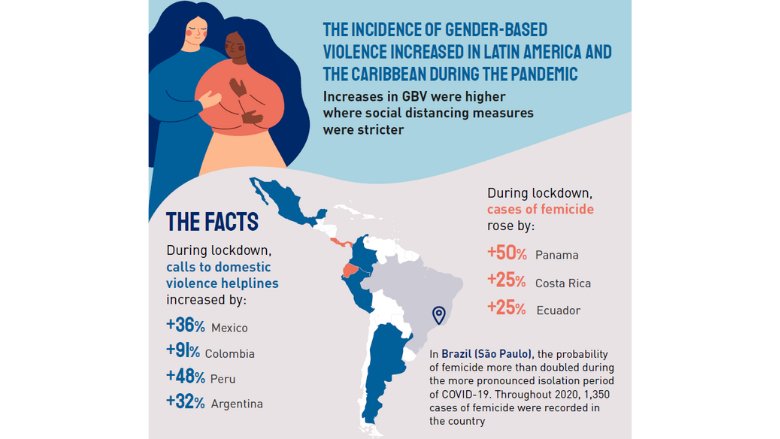Nearly two years after the onset of the Covid-19 pandemic, gender-based violence (GBV) continues to be an ongoing challenge for countries. Following early evidence of increased risks of GBV in the first few months of the pandemic in Brazil and throughout Latin America, impacts persist.
In particular, emerging evidence shows higher increases in GBV were linked to stricter social distancing measures. During lockdown, calls to domestic violence helplines increased, among others, by 91% in Colombia, 48% in Peru, 32% in Argentina, 50% in Panama, and 25% in Costa Rica and Ecuador. In Brazil, the probability of femicides more than doubled during the more pronounced isolation period of the pandemic; and throughout 2020, 1,350 cases of femicide were recorded in the country.
Additionally, while initial spikes of domestic violence during the COVID-19 pandemic were mostly associated with quarantine measures, in later stages of the pandemic, job losses and constrained financial sustainability for women were identified as potential drivers of increased abuse within the home and declines in reporting.
In follow up to our earlier analysis on Addressing Violence against Women (VAW) under COVID-19 in Brazil and as part of ongoing work to provide support to national governments in understanding the increased risks of GBV under Covid-19, these notes explore the impacts of Covid-19 social distancing measures on the incidence of violence against women in Low- and Middle-Income Countries, in particular in Latin America and Brazil, as well as how public policies aimed at mitigating the negative consequences of social distancing and increased risks of violence have influenced GBV levels.
COVID-19 and Violence Against Women in Low-and Middle-Income Countries (English)
COVID-19 and Femicides in Brazil
These notes were conducted jointly by the World Bank team, led by Paula Tavares, Flávia Carbonari and Manuel Contreras and the BRAVE team, led by Maria Dolores Montoya-Diaz, Fabiana Rocha, Paula Pereda (University of São Paulo, Brazil) and Rodrigo Moreno-Serra (University of York, United Kingdom).
Last Updated: Jan 06, 2023
